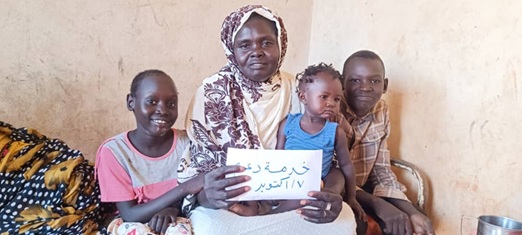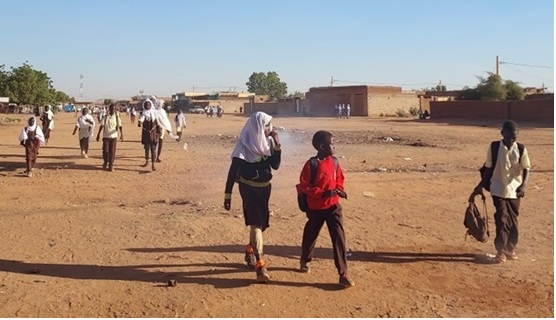Dutch beignets and fundraising campaigns
The past year ended with two major beignet baking campaigns in Amersfoort and Rotterdam in the Netherlands. Board members Marjan van der Horst and Elseline Tuinier and their sisters together baked more than 1,400 beignets, raising some €2,500 for our food aid in the disadvantaged neighbourhoods around the Elrayan school in Omdurman. People also donated without ordering beignets. It was really wonderful!
In addition, one of our regular donors and music teacher Jonneke Reeser organized the action week How Privilged Am I? at Heerbeek college, a secondary school in Best. After learning about our foundation and the situation in Sudan, the students of class 1 and 2 were asked to form groups to raise money in a sustainable way. By sponsoring a bike ride, selling crocheted dolls and home-baked cupcakes, collecting deposit cans, and more, they raised over €1,600 together.
We are also very grateful to the members of the Muslim University Students of Amsterdam for their fundraiser which raised more than €650.
Our campaign “With €10 per month you provide a Sudanese family with a meal” has also borne fruit. It is good news, because we are now more aware of how to organize the aid this year. But we will also continue our efforts to recruit more donors! So please spread the word.
When the Sudanese pound took a nosedive last year and the Euro yielded much more, the modest contributions to Elrayan School teachers were not increased, but it was decided to divide the extra amount into small portions and offer it to Elrayan School students from needy families, refugees from other neighbourhoods camping at the Elrayan School, and a number of other poor families in the area.
The two kitchens in the neighbourhoods will run until the end of this month. Very soon the board will have another meeting, where we will discuss the proposals of the Elrayan School management on the progress of this food aid and direct financial support. More on that in the next newsletter.
War and hunger
Sudan has by now moved up in the food emergency rankings. It is currently one of the four countries with the “highest acute malnutrition rates” in the world. The need is still growing, even as many young Sudanese volunteers are doing what they can to turn foreign aid (mostly from charitable organizations) into food aid, often through soup kitchens in the large cities.
These “neighbourhood volunteers” had organized themselves into resistance committees during the 2018-2019 uprisings against dictator Omar Elbashir. Following the outbreak of war between the army and the paramilitary Rapid Support Forces (RSF) in April 2023, they set up emergency committees to help stragglers and refugees in neighbourhoods as much as possible with food, medicine, and other basic needs. According to Africa correspondent Koert Lindijer, they should have been awarded the Nobel Prize.
The war seems to be going in the army’s favour at the moment, at least in central Sudan. It has now been confirmed that the RSF blockade of the Defencse Ministry in Khartoum has been broken.
Elsewhere in the city there is also heavy fighting, by the RSF with rockets, and by the Sudanese air force with bombings of neighbourhoods where there are many militia men. That this results in many civilian casualties is considered “collateral damage”.
The army leadership is made up of allies of former dictator Bashir, but many people see that as “a problem to deal with in the future”. The important thing is that the war ends and people are able, for better or worse, to get back to their old lives, no matter how poor they were before the war.
Escaped from death
In Jabarona, in west Omdurman, about two weeks ago, a barrel bomb exploded in a market, where both RSF militia men, who occupy the neighbourhood, and civilians like Salwa (who runs the kindergarten which the Foundation has been supporting for about 15 years) sell their wares.
Salwa who sells bags of sunflower seeds and peanuts at a small profit in the market, (“you have to do something if you can’t afford to sit still”) called last week with the news. She herself had only just escaped and was very shocked.
She said between one hundred and one hundred and fifty people had been affected. “Many of the wounded, sheltering in houses whose residents had fled, died later because there was hardly any medical help.”
She furthermore spoke of heavy shelling by the paramilitaries, but army drones were also involved: “The colours in the sky looked like a animated film at times.”
Today she called again, using Starlink, on a friend’s smartphone. “There is much less fighting now, but armed robberies and thefts are on the rise. Every day you hear about someone who has been robbed and injured in the process. A lot of firewood is also being stolen because it has become so scarce,” she told me. “People are desperate because they go hungry. We all hope the war stops as soon as possible, because it cannot go on like this.”
In any case, Salwa herself continues to deliver food packages as invisibly as possible to about 22 families in the area.

Good news
But there is also good news, as the Eisa Mahanna school for children with disabilities in Elgezira Aba is reopening soon, and the Elrayan school in Omdurman is starting again with two classes.
The small self-help school in Elgezira Aba, about 300 kilometres south of Khartoum, has reached an arrangement with the refugees who were camping out there, so that one of its two classrooms could be used again. Classes alternate with outdoor activities.
The plan was to reopen the Eisa Mahanna School already in early December, but it had to be postponed due to a crisis situation caused by the high level of the White Nile, which threatened to flood the island. Hundreds of houses, built with mud bricks (sun-dried building bricks) collapsed, the water treatment plant stopped working, and the island was scourged by cholera. Fortunately, the water has now receded and the children will after all be able to attend school, with transportation funded by our Foundation.
A start with two classes
Although missiles continue to fall sporadically south of the Elrayan school, neighbourhoods 43 and 44 in the Elsawrad district remain spared from immediate danger. They do suffer from prolonged power cuts and in recent weeks hardly any water came out of the tap.
Three teachers living in the neighbourhood prepared two of the four makeshift classrooms at Elrayan Middle School[1] in Ward 43 early this month for provisional classes for elementary school students. They are thinking of a combination class for years 1-2-3 and one for 4-5-6. They have submitted a budget to the foundation, which we will discuss as soon as possible.
The three teachers have already started with small groups of students and hope to continue with full classes after posting announcements in the neighbourhood, with the subjects Arabic and math. For English, a new teacher will be hired temporarily, as the two permanent English teachers live further away and walking to school is not yet safe enough.

For now, we continue to look for ways to keep supporting a small part of the population of Sudan for as long as necessary. Your help in this effort is vital.
Warm regards from The Education East Africa Foundation (Djûke, Marijke, Marcel, Marjan, Khalid, Elseline, Nadim, and Rianne).
Amsterdam, 27 January 2025
——————————
Have you received this newsletter through others and want to be kept informed yourself from now on? Then email us at onderwijsoostafrika@yahoo.com.
For more information: https://onderwijsoostafrika.com
Donations: Stichting Onderwijs Oost-Afrika, Amsterdam, NL27 TRIO 0198 36 7171.
[1] As of school year 2022-2023, the education system in Sudan, which consisted of eight years of elementary school and three years of secondary school, changed into six years of elementary school, three years of middle school, and three years of high school.